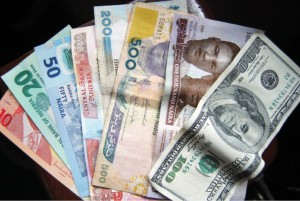Naira Heads For Best Month In Six As Oil Companies Sell Dollars
The naira gained, heading for its best monthly performance since February, as oil companiessold dollars and on continued inflows into Nigeria’s sovereign debt market.
The currency of Africa’s biggest oil producer appreciated as much as 0.2 percent and traded 0.1 percent stronger at 158 a dollar as of 2:27 p.m. in Lagos, the commercial capital, according to data compiled by Bloomberg. The naira has climbed 1.7 percent this month, the second-best performer in Africa.
“The naira is supported by foreign exchange sales from oil companies in the interbank marketwhich are likely to also continue tomorrow,” Samir Gadio, a London-based emerging marketsstrategist at Standard Bank Group Ltd., said in an e- mailed reply to questions. “Continued foreign capital flows into the fixed-income market have also supported the unit.”
The oil industry is the second major source of dollar supplies in the country after the Central Bank of Nigeria, which offers dollars at auctions on Mondays and Wednesdays and through interbank trading to maintain exchange-rate stability.
The yield on Nigeria’s 7 percent domestic bonds due October 2019 dropped 53 basis points to 14.97 percent, according to yesterday’s data on the Financial Markets Dealers Association website. Yields on the nation’s $500 million of Eurobonds due January 2021 increased one basis point to 4.9 percent today.
Nigeria’s domestic bonds are being considered for addition to JPMorgan Chase & Co.’s government bond emerging market index series on Oct. 1, according to a note obtained from the bank.
“Confidence has improved in the foreign exchange market in recent weeks,” said Gadio. “There is certainly a strong case for increased foreign portfolio inflows.”
Inflation Rate
Central bank Governor Lamido Sanusi said on Aug. 23 that the inflation rate may not rise as high this year as the regulator previously forecast after prices were little changed at 12.8 percent in July. The central bank predicted on Jan. 31 it would reach as high as 14.5 percent after the government cut a gasoline subsidy in the same month.
Nigeria’s foreign reserves rose to a two-year high of $38 billion, according to Aug. 24 data compiled by the Abuja-based central bank. The country’s benchmark Bonny Light crude has gained 25 percent since a low this year in June.
Source: Bloomberg.com









